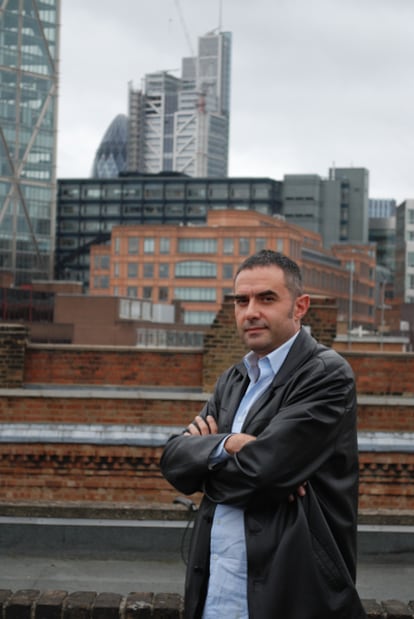"Either things change, or we are leaving"
Spanish architect Alejandro Zaera Polo does not stay on a project he cannot thoroughly command; recently he turned down a project for the 2012 Olympics
Alejandro Zaera Polo is a man who knows how to say no. On one occasion, the architect and founder of the London-based Foreign Office Architects (FOA), declined to continue working on a project for the 2012 Olympic Games in that city. Another time, he refused to recognize the Legal Medicine Institute he had partly built at the Justice Campus in Madrid as his own. Either the decisions were being made by others, or the budget wasn't right. There are professional concerns that cannot yield to political or economic pressure, he says.
Zaera, 47, who became world-famous after building the Yokohama International Port Terminal in 2002, admits that abandoning the London project was, up to a certain point, involuntary.
There are concerns that cannot yield to political or economic pressure, he says
"When they come at you with this attitude, you realize there's nothing you can do."
"It was a very interesting experience because it gave us the chance to work at that level with huge teams of engineers and specialists. But from day one I knew we would end up doing nothing - that we'd be used to generate a set of images that would make a good sell. I knew that in the English-speaking world, in the end, this type of project always ends up in the hands of the same companies. It's systematic - whether you're in Australia or Beijing, everything always ends up in the hands of these large companies, because they're the ones with the brawn, and not just the brawn, because in the end brawn is made up of a team of people, but... the responsibility makes politicians so afraid that they only feel confident if they have one of these large companies behind them."
So in this specific case, the role of FAO was that of image creation. "Basically, the situation was that every time the project had to be presented to a quality commission, we were placed at the helm, but after that we were back at the rear again. There were these individuals who made decisions, and we had no option of saying that this or that should be done differently. So at one point we took a chance and said, 'Either you change the way things are done around here or we're leaving.' And they said, 'Then you're leaving'.
"Something similar occurred with the Legal Medicine Institute at the Justice Campus in Madrid, although the reasons for quitting were different. The Justice Campus is an ambitious project initiated by the Madrid regional government, which hired prestigious architects such as Norman Foster, Richard Rogers and Zaha Hadid to create the buildings that will house most of the legal institutions now scattered throughout Madrid. Construction began in 2008 and the estimated completion date is this year.
"In Madrid, there was an original desire to create an important project and to announce tenders for it. We won one of the first contracts. We were the quickest to react, because our building was the smallest. But the project was clearly under-budgeted: ¤960 per square meter, including the cooling systems, etc. Right after winning, I told the client, 'Let's be realistic; it cannot be built with this amount of money.' And they replied, 'Yes, we know; let's see what you can do.' Time went by, and nobody made a single decision. When a project has an economic variation of nearly 50 percent, as was our case, the Madrid regional assembly has to approve the reforms."
Zaera says that Alfredo Prada, then Madrid's justice and interior commissioner, told him to go ahead and make the necessary changes. But two days after his studio turned in the report with the alterations, regional premier Esperanza Aguirre dismissed Prada and replaced him with Francisco Granados, "his worst enemy" in Zaera's estimation. The changes were turned down.
"So I said, 'Then I'm leaving, because I'm not playing this game. Nobody is going to put a sign in front of my building saying it was made on ¤900 per square meter'," he recalls. Zaera says he was then offered a little more money, but he still refused.
"I also disliked the way they did it, because they told me, 'We're giving [Norman] Foster
¤2,500 more because he's special, and we're going to fire Zaha [Hadid].' I swear it was like this. I should have recorded it. When they come at you with this attitude, you realize there's nothing you can do. They paid me for the reforms and I left. I let them continue with the project on the condition that my name would not be used. They hired another architect and completed it. I don't really know what they're going to do with the building."

Tu suscripción se está usando en otro dispositivo
¿Quieres añadir otro usuario a tu suscripción?
Si continúas leyendo en este dispositivo, no se podrá leer en el otro.
FlechaTu suscripción se está usando en otro dispositivo y solo puedes acceder a EL PAÍS desde un dispositivo a la vez.
Si quieres compartir tu cuenta, cambia tu suscripción a la modalidad Premium, así podrás añadir otro usuario. Cada uno accederá con su propia cuenta de email, lo que os permitirá personalizar vuestra experiencia en EL PAÍS.
¿Tienes una suscripción de empresa? Accede aquí para contratar más cuentas.
En el caso de no saber quién está usando tu cuenta, te recomendamos cambiar tu contraseña aquí.
Si decides continuar compartiendo tu cuenta, este mensaje se mostrará en tu dispositivo y en el de la otra persona que está usando tu cuenta de forma indefinida, afectando a tu experiencia de lectura. Puedes consultar aquí los términos y condiciones de la suscripción digital.








































